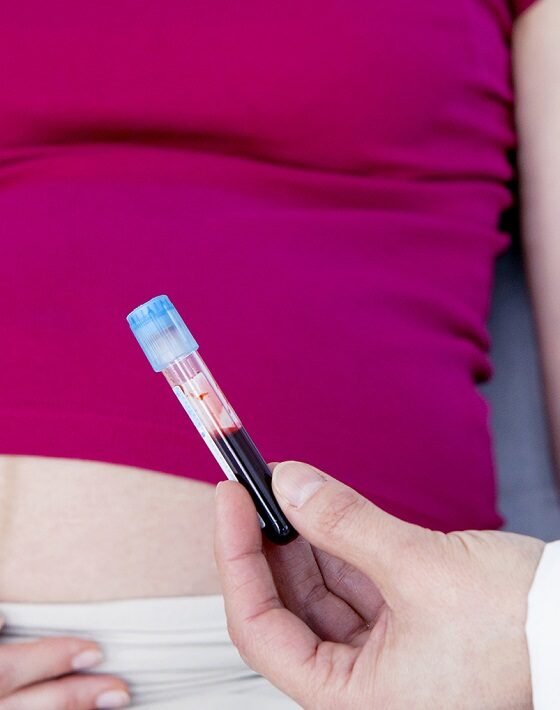
First Trimester Prenatal Tests: What Moms-to-Be Should Expect
First Trimester Prenatal Tests: What Moms-to-Be Should Expect

Welcome to the first trimester of your pregnancy adventure! It’s a whirlwind of excitement and much love for your growing baby. This is when you’ll hop in and out of the doctor’s office for all those essential checkups and tests. These loving check-ins and little health tests you have during your pregnancy are what we sweetly call prenatal care. Think of them as sweet little high-fives to your baby, ensuring they grow strong and healthy.
Prenatal care is like your unique mommy superpower. It’s the best way to ensure you and your little one are doing awesome at every stage. Each appointment, each little test, is a step closer to meeting your beautiful baby. Here’s a friendly guide to what’s in store:
First Prenatal Visit (around eight weeks): This is your “officially pregnant” appointment! Your doctor will confirm the great news and give you an estimated due date for your bundle of joy.
Blood Tests: A bit of a pinch, but these tests are super important. They check your blood type and Rh factor (to ensure there are no issues with the baby’s blood type), screen for anemia, and look for signs of infections like syphilis, hepatitis B, and HIV. Plus, they’ll ensure you’re immune to rubella (German measles) and chickenpox.
Urine Tests: A quick pee in a cup to check for any urinary infections and ensure there aren’t any sneaky signs of diabetes or preeclampsia (a condition that needs to be watched for during pregnancy).
Pap Smear: This test is about ensuring your cervix is in top shape, and there are no signs of cancer.
Chorionic Villus Sampling (CVS) (10-13 weeks): If there’s any concern about genetic issues, this test takes a teeny sample from the placenta. It checks for chromosomal conditions like Down syndrome. It’s more in-depth and helps you make informed choices about your pregnancy.
Ultrasound: The magical moment when you first see your baby! It confirms your pregnancy, lets you hear that precious heartbeat, and helps pin down the due date. Early in the trimester, it’s great for getting the timing right, and between 11-14 weeks, it’s part of a particular health check. If your pregnancy is high-risk, you might get to see your baby more often with extra ultrasounds.
First Trimester Screen (11-13 weeks): This includes a special ultrasound and blood tests. They check the nuchal translucency (the fluid area at the back of the baby’s neck) and hormone levels in your blood. This combo gives an idea if there might be a risk of chromosomal abnormalities like Down syndrome.
Cell-free DNA Testing/NIPS (from 10 weeks): This blood test looks for bits of your baby’s DNA in your blood. It’s a heads-up test, not a final answer, but it helps to see if there’s a risk of chromosomal disorders. It’s especially recommended if you’re a bit older or have had a pregnancy with chromosomal disorders. If anything unusual pops up, more tests will follow for confirmation.
Remember, all these tests are just steps to ensuring you and your baby are as healthy as possible. It’s the perfect time to ask your doctor all your questions and share how you’re feeling. They’re there to guide and support you through every step of this fantastic journey!
Other Tests that Your Doctor Might Offer
Along with the usual tests during pregnancy, there are a bunch of extra checks your doctor might suggest based on your health, family background, and any particular concerns. Also, these tests are all about checking if you or your little one might be at risk for certain health conditions. Let’s dive into what these could be:
Specialized Ultrasounds: Consider these as your little one’s first photo ops! If your doctor wants a better view of your baby’s growth or the location of their placenta, they may suggest a high-definition ultrasound. It’s like getting a VIP tour of your baby’s tiny world, ensuring they’re growing just right and everything is where it should be.
Glucose Test: Around 24-28 weeks, you’ll have a date with a sweet, syrupy drink. It’s like a sugary challenge to check if gestational diabetes is trying to sneak into your pregnancy. You’ll drink the liquid, hang out for a bit, and then have a quick blood test to ensure your sugar levels are in the happy zone.
Group B Strep Detective Work: As you near the finish line (around 35-37 weeks), you’ll be checked for Group B strep. It’s a common little germ that can be a bother during birth. If it’s found, don’t fret – you’ll get antibiotics during labor to protect your precious bundle.
Amniocentesis Insight: If earlier tests give a heads-up about potential genetic or chromosomal concerns, or if your age or family history puts you in a higher risk bracket, amniocentesis might be on the cards. Doctors typically conduct this test between the 15th and 20th weeks of pregnancy. It involves extracting a small amount of fluid surrounding the fetus to obtain highly detailed information about its genetic well-being. It’s a bit sci-fi, but it gives critical insights.
BPP(Biophysical Profile): You might have a biophysical profile in your third trimester. This combo of an ultrasound and a non-stress test is like getting a full report on how your baby is doing. It checks their movements, breathing, muscle tone, heart rate, and the amount of amniotic fluid. It’s like getting a sneak peek at how your little one is prepping for their big debut!
Doppler Fetal Monitoring: This is pretty interesting. They use sound waves, like a mini-submarine sonar, to check how blood flows in your baby. It’s a great way to ensure your baby gets enough nutrients and oxygen through the placenta.
Cervical Length Measurement: If there’s a worry about preterm labor, this is like using a “ruler” via ultrasound to measure your cervix. It’s a quick way to see if everything’s staying put for a full-term pregnancy.
Additional Blood Tests: You might need extra blood tests based on your health and history. For example, if you’re tired, they might check for iron deficiency to ensure you’re not anemic.
Fetal Echocardiography: This is like a detailed heart checkup for your baby, especially if heart issues run in the family or a previous test showed something unusual. It’s like getting a sneak peek at your baby’s tiny heart to ensure it’s beating strong and healthy.
Cytomegalovirus (CMV) Testing: CMV is a common virus but can be troublesome for newborns. If you’re around little kids a lot or might have been exposed, a simple blood test can check if you’ve caught it.
Tay-Sachs Disease Screening: If your family history suggests a risk or if you belong to certain groups like Ashkenazi Jewish or French-Canadian, a blood test can screen for this genetic condition. It’s a way of being extra sure about your baby’s genetic health.
Thyroid Disease Screening: Pregnancy can make your thyroid go a bit haywire, so your doctor might want to check on it, especially if you’ve had thyroid issues before or are showing symptoms.
Toxoplasmosis Testing: This is an infection you can get from cats or undercooked meat, and it can affect the baby. If you’re at risk or feeling symptoms, a blood test can tell if you have it. It’s a way of ensuring one of those sneaky infections isn’t bothering your little one.
Hepatitis C Screening: This one’s like a precautionary check. If you’ve had specific experiences, like using IV drugs in the past or receiving blood transfusions before 1992, your doctor might suggest a simple blood test. It’s just to ensure your liver isn’t dealing with Hepatitis C, which can be sneaky and not show symptoms for a while.
Fragile X Syndrome Testing: This test comes into play if there’s a whisper of Fragile X syndrome in your family tree or if you’ve faced challenges with fertility. It’s a genetic test that peeks into your baby’s DNA to check for this particular mutation. Think of it as a warning about a potential genetic hiccup that could affect your little one.
Tuberculosis (TB) Testing: TB is one of those old-school bugs that still pops up. If you’ve recently traveled to places where TB is common or been around someone with TB, your doctor might recommend a skin or blood test. It’s like a quick scan to ensure this bug hasn’t hitched a ride.
And remember, not every test is a must for every mom-to-be. Your doctor is like your guide, helping you navigate which screening tests are essential for your unique pregnancy path. They’re there to ensure you and your baby get the best care tailored just for you.
Now, about the Glucose Test. This one’s pretty standard and super important as it checks for gestational diabetes, which can sneak up during pregnancy. But, just like picking out baby names, you have a say. You can talk to your doctor if you’re not keen on taking the glucose test. It’s all about making choices that feel right for you and your baby and keeping you happy and healthy on this incredible journey.






